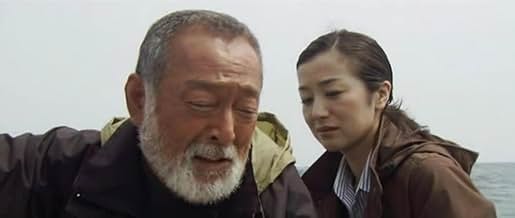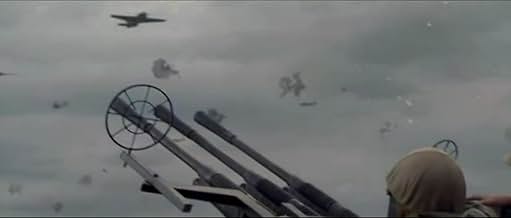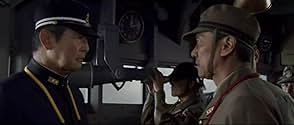CALIFICACIÓN DE IMDb
6.4/10
2.5 k
TU CALIFICACIÓN
La historia de la batalla final y desesperada del Yamato de la Armada Imperial Japonesa, el mayor acorazado de la Segunda Guerra Mundial.La historia de la batalla final y desesperada del Yamato de la Armada Imperial Japonesa, el mayor acorazado de la Segunda Guerra Mundial.La historia de la batalla final y desesperada del Yamato de la Armada Imperial Japonesa, el mayor acorazado de la Segunda Guerra Mundial.
- Premios
- 6 premios ganados y 7 nominaciones en total
Sôsuke Ikematsu
- Atsushi
- (as Sosuke Ikematsu)
Opiniones destacadas
On April, 6th 2005, in Makurazi, Kagoshima, Makiko Uchida (Kyôka Suzuki) seeks a boat in the local fishing cooperative to take her to the latitude N30, longitude L128, where the largest, heaviest and most powerfully armed battleships ever constructed Yamato was sunk on April, 7th 1945; however, her request is denied. She meets by chance the captain Katsumi Kamio (Tatsuya Nakadai) of the fishing vessel Asukamaru and discloses that she is the stepdaughter of Officer Nagoya Uchida (Shidô Nakamura) and Kamio immediately accepts to take her in the risky journey. While traveling with Makiko and the fifteen year-old Atsuchi (Sosuke Ikematsu), Kamio recalls and discloses the story of Yamato and his close friends that served on board of the battleship until the final suicidal mission in Okinawa. When they reach the spot where Yamato was sunk, he considers that he finally reached the end of the Shōwa era.
"Otoko-tachi no Yamato" is a dramatic movie based on the true story of the Battleship Yamato in World War II. This film gives an approach of Japanese relationship in war totally different from the stereotype of American and European movies of this genre that usually treat Japanese soldiers as cold blood killers detached from any emotions. In "Yamato!", the Japanese military are human beings, with beloved ones, families and comradeship between them, giving more credibility to the story. However, director Junya Sato exaggerates in the melodramatic subplots and in many moments the viewer has the sensation of watching a soap-opera instead of a drama. The final battle of Yamato is engaging and one of the best moments of this film. The music score is repetitive and boring and I personally did not like it. Last but not the least, the Shōwa period mentioned by Katsumi Kamio in one of his last lines literally means, in accordance with the Wikipedia, "period of enlightened peace", or Shōwa era, is the period of Japanese history corresponding to the reign of Emperor Shōwa (Hirohito), from December 25th, 1926 to January 7th, 1989. My vote is seven.
Title (Brazil): "Yamato"
"Otoko-tachi no Yamato" is a dramatic movie based on the true story of the Battleship Yamato in World War II. This film gives an approach of Japanese relationship in war totally different from the stereotype of American and European movies of this genre that usually treat Japanese soldiers as cold blood killers detached from any emotions. In "Yamato!", the Japanese military are human beings, with beloved ones, families and comradeship between them, giving more credibility to the story. However, director Junya Sato exaggerates in the melodramatic subplots and in many moments the viewer has the sensation of watching a soap-opera instead of a drama. The final battle of Yamato is engaging and one of the best moments of this film. The music score is repetitive and boring and I personally did not like it. Last but not the least, the Shōwa period mentioned by Katsumi Kamio in one of his last lines literally means, in accordance with the Wikipedia, "period of enlightened peace", or Shōwa era, is the period of Japanese history corresponding to the reign of Emperor Shōwa (Hirohito), from December 25th, 1926 to January 7th, 1989. My vote is seven.
Title (Brazil): "Yamato"
There are two things about this movie that make it more than a little absurd. Of course US movies tell the US perspective, and Japanese movies will tend to tell theirs. But Japan does not even teach what happened in World War II, no one growing up after the war has ever been taught what they did to the subjects under their rule, or that they started hostilities. This is why China and Korea to this day maintain a cold peace with Japan. They have not forgotten.
So this movie once again skips over anything -- Japanese perspective or not -- about the war, and focuses on the only thing Japan has ever focused on since -- their own suffering.
The other thing is that the fight scenes make it look like they are at least making the US pay a heavy price. This is typical Japanese face- saving. If you are going to make a movie about these dead heroes to the state, you have to at least make it look like they died being somewhat competent. In fact, the count for the day was something like 10 US planes downed, and 14 pilots wounded. Considering that 4000 Japanese sailors died, this was an incredibly lopsided fight. So in other words, the battle must have looked very, very different than this movie.
I understand that a Japanese director probably cannot make a movie in which Japanese sailors are dying by the thousands -- and ARE NOT EVEN ABLE to inflict much damage in return. But that isn't US propaganda -- that is what happened. Surely at this point, it's time for someone to tell the young people of Japan something closer to the truth? Yes, Japan paid for its mistake, but it was not an innocent victim.
In 2001 I taught for six weeks in Japan, 2 weeks before, then later 4 weeks after 9/11. My students incredulously asked me in amazement "who would think of using an airplane as a suicide weapon and killing themselves and lots of other people?" They had not even HEARD of kamikazes! I did not have the heart to enlighten them, so I restrained my natural response "Your people invented this!"
Modern pacifist Japan is rooted in ignorance, and this movie contributes nothing to understanding. This is the telling of a war that happened in another dimension, not here. This is a tale from a Japan that still cannot own up to its own history.
So this movie once again skips over anything -- Japanese perspective or not -- about the war, and focuses on the only thing Japan has ever focused on since -- their own suffering.
The other thing is that the fight scenes make it look like they are at least making the US pay a heavy price. This is typical Japanese face- saving. If you are going to make a movie about these dead heroes to the state, you have to at least make it look like they died being somewhat competent. In fact, the count for the day was something like 10 US planes downed, and 14 pilots wounded. Considering that 4000 Japanese sailors died, this was an incredibly lopsided fight. So in other words, the battle must have looked very, very different than this movie.
I understand that a Japanese director probably cannot make a movie in which Japanese sailors are dying by the thousands -- and ARE NOT EVEN ABLE to inflict much damage in return. But that isn't US propaganda -- that is what happened. Surely at this point, it's time for someone to tell the young people of Japan something closer to the truth? Yes, Japan paid for its mistake, but it was not an innocent victim.
In 2001 I taught for six weeks in Japan, 2 weeks before, then later 4 weeks after 9/11. My students incredulously asked me in amazement "who would think of using an airplane as a suicide weapon and killing themselves and lots of other people?" They had not even HEARD of kamikazes! I did not have the heart to enlighten them, so I restrained my natural response "Your people invented this!"
Modern pacifist Japan is rooted in ignorance, and this movie contributes nothing to understanding. This is the telling of a war that happened in another dimension, not here. This is a tale from a Japan that still cannot own up to its own history.
The destruction of the giant battleship by overwhelming Allied air power following the destruction from the air of 3 previous giant Axis battleships (Bismarck, Musashi and Tirpitz) was a gigantic tragedy of common enlisted soldiers defending their "fatherland".
The mission accomplished nothing but another one-sided slaughter of "obedient soldiers". This is the real tragedy of men educated for obedience. Germans and Japanese alike.
And they were killed with millions against overwhelming (and technically also superior) powers by an opportunistic and docile dictatorship, leaving behind millions of sorrowing wives and children which never saw much of their fathers.
Otoko-tachi no Yamato shows us the common Japanese soldiers as human beings. No propaganda at all, unlike so many US war movies.
Its counterpart was the German movie "Das Boot". The difference is that in Germany the process of showing World War II as it was started earlier than in Japan. Even the horrendous loss of the Wilhelm Gustloff (10.000 dead)has been shown in a movie on the German television recently. In Japan the horrors of WWII finally are being shown to the public. While Germany feels "very guilty" for many decades, this process in Japan not really has been started yet.
The mission accomplished nothing but another one-sided slaughter of "obedient soldiers". This is the real tragedy of men educated for obedience. Germans and Japanese alike.
And they were killed with millions against overwhelming (and technically also superior) powers by an opportunistic and docile dictatorship, leaving behind millions of sorrowing wives and children which never saw much of their fathers.
Otoko-tachi no Yamato shows us the common Japanese soldiers as human beings. No propaganda at all, unlike so many US war movies.
Its counterpart was the German movie "Das Boot". The difference is that in Germany the process of showing World War II as it was started earlier than in Japan. Even the horrendous loss of the Wilhelm Gustloff (10.000 dead)has been shown in a movie on the German television recently. In Japan the horrors of WWII finally are being shown to the public. While Germany feels "very guilty" for many decades, this process in Japan not really has been started yet.
The movie has a very touching human side, an a sinister historic side.
The human story inside the story also is moving.
The major flaw of it, is that is too long. It gets unnecessary and frequently lost in details.
The human story inside the story also is moving.
The major flaw of it, is that is too long. It gets unnecessary and frequently lost in details.
This is not the first time that I saw the sunk of Yamoto in Nippon movie. The precedent movie are "Rengo kantai" (1981), or additionally, some movie relative with Nippon naviation or 'Zero' fighter. With its poor battle result, the Yamoto was not more than a symbol of power, which main function was to satisfy people's adoration need, similar with the enthusiasm to sumotori of Japanese.
Though it praised the braveness of soldiers, it can't bear comparison with "Sink the Bismarck" (1960), in which the defeated Germany wined British's respect (It's ridiculous when a US veteran present his awedness to rival in the start and final of "Lorelei: The Witch of the Pacific Ocean" (2005)).
But this is not a historically narrative film. It also abandon the scanty criticism tradition of Japanese war movie before 90's. The tradition of vagueness of moral sense in Japanese movie is still there. No context was given to transmit the information about the cause to this tragedy, without which the sense of sacrifice to protect others is so pale. The script seemed to cater to the current civil circumstance. So this is a real "anniversary" movie within a predefined frame.
The cast were very good. Despite the unnaturalness of the plot corresponding to modern society, Tatsuya Nakadai is still my favorite actor. It's a pity that Japanese movie is losing its classic art orientation and international influence after the fade of masters directors.
The 3D effect is just so so, light is somewhat dim, and the color is always monotonously the hull's hue. Fortunately, the wave is no longer that appeared in old movie adopt the ship model. Music is better than "Lorelei: The Witch of the Pacific Ocean".
Though it praised the braveness of soldiers, it can't bear comparison with "Sink the Bismarck" (1960), in which the defeated Germany wined British's respect (It's ridiculous when a US veteran present his awedness to rival in the start and final of "Lorelei: The Witch of the Pacific Ocean" (2005)).
But this is not a historically narrative film. It also abandon the scanty criticism tradition of Japanese war movie before 90's. The tradition of vagueness of moral sense in Japanese movie is still there. No context was given to transmit the information about the cause to this tragedy, without which the sense of sacrifice to protect others is so pale. The script seemed to cater to the current civil circumstance. So this is a real "anniversary" movie within a predefined frame.
The cast were very good. Despite the unnaturalness of the plot corresponding to modern society, Tatsuya Nakadai is still my favorite actor. It's a pity that Japanese movie is losing its classic art orientation and international influence after the fade of masters directors.
The 3D effect is just so so, light is somewhat dim, and the color is always monotonously the hull's hue. Fortunately, the wave is no longer that appeared in old movie adopt the ship model. Music is better than "Lorelei: The Witch of the Pacific Ocean".
¿Sabías que…?
- TriviaPart of the foredeck and port side of the Yamato were reconstructed to full scale for the exterior scenes. As the Japan Building Standards Act interfered with re-creating the ship's entire superstructure, images of a one-tenth scale model of the Yamato at its namesake museum in Kure were used in post-production.
- ErroresThe ship is seen firing salvos from its main batteries aimed at approaching US aircraft on several occasions, while lots of the crew are visible on deck, manning the light AA guns as well as performing other duties. While the big guns were in fact used fending off aircraft, at least during the last battle off Okinawa, the shock wave from the blast of the nine 460 mm barrels (the biggest ever on a warship) could kill or severely injure an unprotected sailor, it was therefore forbidden to remain on deck on such occasions.
- Citas
Mamoru Uchida: [Firing an AA gun defiantly as the ship sinks] I'm not done yet! My last throw!
Selecciones populares
Inicia sesión para calificar y agrega a la lista de videos para obtener recomendaciones personalizadas
- How long is Yamato?Con tecnología de Alexa
Detalles
- Fecha de lanzamiento
- País de origen
- Sitio oficial
- Idioma
- También se conoce como
- The Pacific Battleship: Yamato
- Locaciones de filmación
- Productoras
- Ver más créditos de la compañía en IMDbPro
Taquilla
- Total a nivel mundial
- USD 39,287,114
- Tiempo de ejecución2 horas 25 minutos
- Color
- Mezcla de sonido
- Relación de aspecto
- 2.35 : 1
Contribuir a esta página
Sugiere una edición o agrega el contenido que falta
























